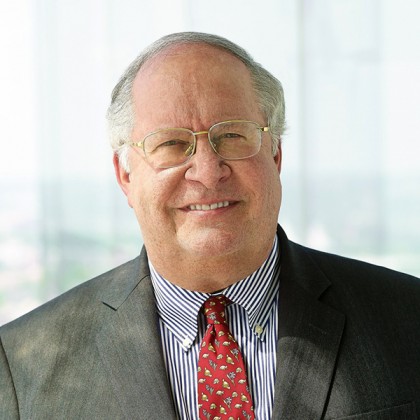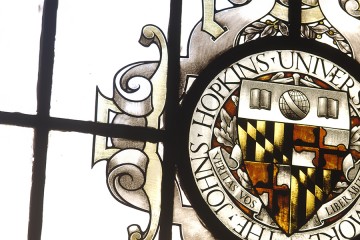Legendary investor William H. "Bill" Miller III has committed a record $75 million to the Johns Hopkins University Department of Philosophy to broaden and intensify faculty research, graduate student support, and undergraduate study of philosophical thought.

Image caption: William H. "Bill" Miller III
The gift is believed to be by far the largest ever to a university philosophy program. It is also the largest to Johns Hopkins for any department in the humanities.
Miller, founder and chairman of Miller Value Partners and formerly the longtime, highly successful manager of the Legg Mason Capital Management Value Trust, is himself a former Johns Hopkins philosophy graduate student.
"I had taken exactly one philosophy course in college, but it led me to read a lot more philosophy when I was in the Army during the Vietnam War," said Miller, 67. "I decided to apply to a PhD program once my time in the military was ending.
"I attribute much of my business success to the analytical training and habits of mind that were developed when I was a graduate student at Johns Hopkins," said Miller, who is best known for beating the Standard & Poor's 500 with his Legg Mason fund for a record 15 consecutive years, from 1991 to 2005.
"I am delighted to be able to show my gratitude by helping to move the department to its rightful place among the best in the country," he said.
Ronald J. Daniels, president of Johns Hopkins University, said Miller's aim—and the university's—is to set a new standard for excellence in philosophy and promote powerful, change-making collaboration between philosophers and other scholars.
"Philosophy matters," Daniels said. "Philosophy defines what it is to be human, to lead lives that are meaningful, and to create societies that are just and humane. The contemporary challenges of the genomics revolution, the rise of artificial intelligence, the growth in income inequality, social and political fragmentation, and our capacity for devastating war all invite philosophical perspective. Bill Miller's unprecedented commitment to our Department of Philosophy underscores the continuing vitality and relevance of the humanities."
The gift brings to nearly $250 million the support for humanities and social sciences fields raised during the university's Rising to the Challenge campaign. Additionally:
- A $10 million gift in 2016 established the Alexander Grass Humanities Institute to advance literature, art, philosophy, history, and other cultural studies
- Last year, a commitment of $150 million created the Stavros Niarchos Foundation Agora Institute to address the need for civic engagement and civil discourse in healthy democracies
- The Aronson Center for International Studies, created with a $10 million gift from Jeffrey H. Aronson, chair of the board of trustees, and his wife, Shari, supports scholarship on major world issues and give students new opportunities to pursue international relations
"Bill Miller, like so many members of our Johns Hopkins family, greatly appreciates the extraordinary value of traditional liberal arts disciplines for our students, the university, and the world," said Beverly Wendland, dean of the university's Krieger School of Arts and Sciences, home to the Philosophy Department. "His dual perspective as a business leader and an intellectually curious lifelong student of philosophy is so important."
Also see
Daniels and Wendland said the university is recognizing Miller's generosity by renaming the department in his honor.
"Our talented faculty and the students who will study in the William H. Miller Department of Philosophy for generations to come will always be grateful, as I am, for Bill's confidence in Johns Hopkins," Wendland said.
Miller's gift will help grow the department within 10 years to 22 full-time faculty members from its current 13. It will create an endowed professorship for the chair of the department, eight other endowed professorships, and endowed support for junior faculty members.
The gift will add $10 million to endowed support for philosophy graduate students and postdoctoral fellows. The university also aims to attract more undergraduates to the study of philosophy, in part through new introductory courses and additional interdisciplinary tracks, like the existing minor in bioethics.
"The study of philosophy has been central to Johns Hopkins from the university's beginning in 1876," said Richard Bett, professor and chair of the department. "Bill Miller knows that every student, no matter their major or intended career, can benefit from philosophical study."
The Department of Philosophy at Johns Hopkins is the recipient of a $75 million endowment from investor Bill Miller. We will position ourselves to more actively help lead the discipline into exciting areas of research. Follow JHU Philosophy here on Twitter and Facebook. https://t.co/vn0IbBj8iX
— JHU Philosophy (@jhu_philosophy) January 16, 2018
The story of philosophy at Johns Hopkins includes Josiah Royce, who became a leading voice for absolute idealism. In 1878, he was one of the first four students to earn a Johns Hopkins doctorate. Pragmatist and educational theorist John Dewey followed him, earning his PhD in 1884. Charles Sanders Peirce, the founder of American pragmatism, was on the faculty in the 1880s. Arthur O. Lovejoy, known for studying the history of ideas and theory of knowledge, was a professor from 1910 to 1938.
Miller majored in economics and European history at Washington and Lee University, graduating with honors in 1972. He later served as a military intelligence officer overseas and studied at Johns Hopkins before turning to his career in investments.
Miller's gift is part of Rising to the Challenge: The Campaign for Johns Hopkins, an effort to raise support for students, faculty, research and discovery, clinical care, and interdisciplinary solutions to some of humanity's most important problems. The campaign, supporting both the university and Johns Hopkins Medicine, began in January 2010, was publicly launched in May 2013, and will be completed in June 2018. Rising has exceeded its $5 billion goal, to date raising more than $5.41 billion.
Posted in University News, Politics+Society
Tagged philanthropy, philosophy









